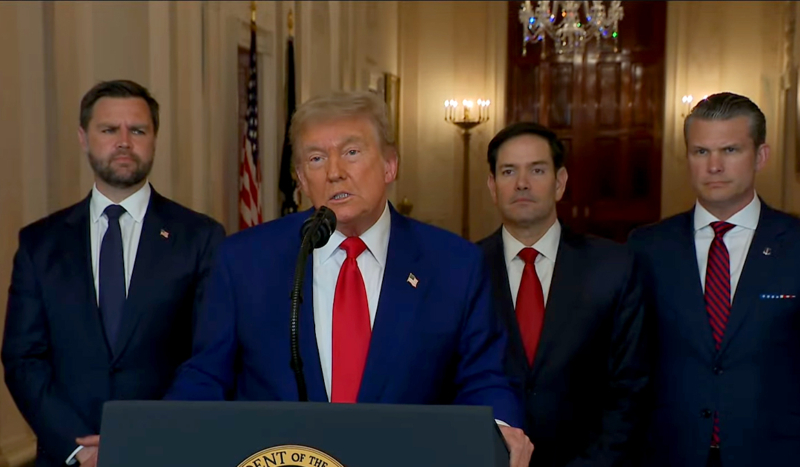
The White House video screengrab / YouTube
President Donald Trump authorized US airstrikes on Iranian nuclear sites after concluding diplomacy had failed to stop the nation’s nuclear ambitions, The Wall Street Journal reported Sunday in a detailed behind-the-scenes account of the operation.
The US strike followed days of escalating attacks between Israel and Iran that began June 13 when Israel launched missile strikes targeting what it described as Iranian nuclear facilities. Iran responded with retaliatory fire, as CatholicVote previously reported.
According to the WSJ, Defense Secretary Pete Hegseth called Trump June 21, as the president flew over his New Jersey golf course, pressing him for a final decision. Advisers said Trump, increasingly convinced that peace talks had failed, gave Hegseth approval for the strikes.
Hours later, Trump announced a “very successful attack on the three Nuclear sites in Iran.”
“Our country is hot as a pistol,” Trump told the WSJ in a brief interview June 22. “Six months ago, our country was cold as ice. It was dead,” he added, calling the strikes “a great victory for our country.”
While Trump faced mounting pressure from both hawks and isolationists leading up to the strike, Middle East envoy Steve Witkoff — who had long sought a deal with Iran — warned that Tehran was merely buying time.
Meanwhile, US and Israeli officials coordinated in Situation Room meetings, even carrying out diversionary military flights designed to mislead Iranian intelligence, the WSJ reported.
Though the White House had signaled days earlier that a decision would come “within the next two weeks,” administration officials told the WSJ that Trump was already strongly inclined to act ahead of the public statement.
The strikes quickly drew international backlash, as Iran’s allies Russia and China condemned the attack.
Moscow warned that several nations are now prepared to supply Tehran with nuclear weapons and claimed Iranian Foreign Minister Abbas Araghchi is heading to Moscow to discuss potential countermeasures.
Critics at home accused Trump of bypassing Congress with the airstrikes, but the WSJ noted Trump’s longstanding opposition to prolonged wars.
In his 2016 campaign trail, Trump frequently denounced the second Iraq War, and during his 2024 campaign, Trump blamed former President Joe Biden for allowing the war in Ukraine and Gaza to continue.
Vice President JD Vance has similarly defended Trump’s record, writing in a 2023 opinion column that Trump’s “best foreign policy” was “not starting any wars.”
As of now, neither the US nor Iran has issued a formal declaration of war.

